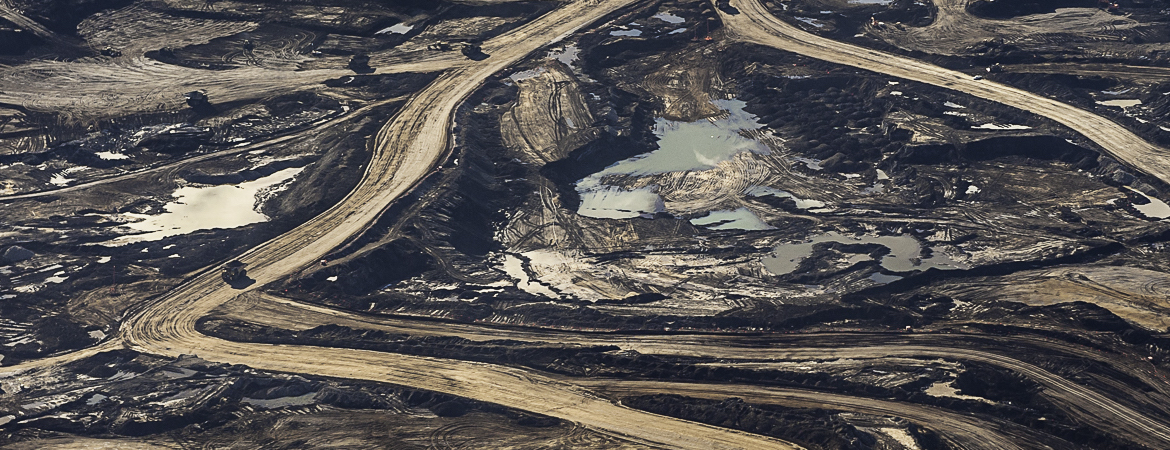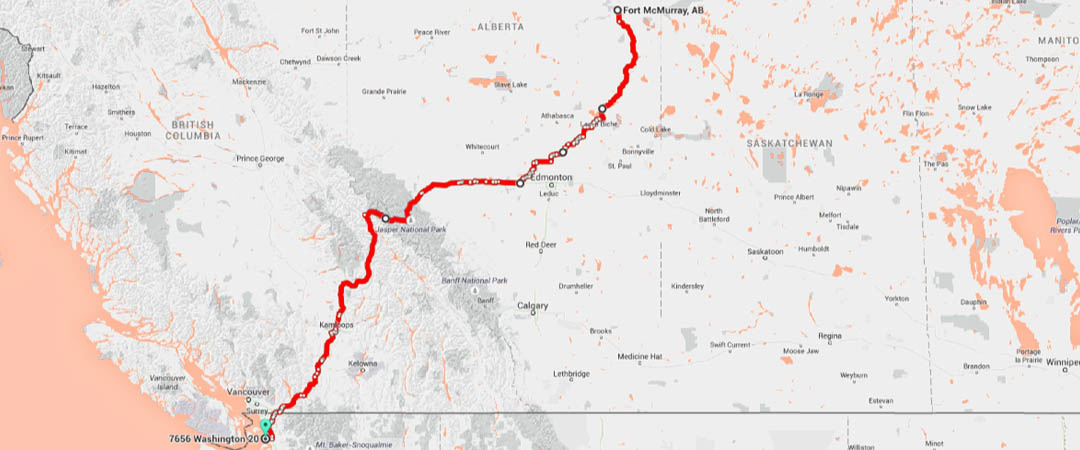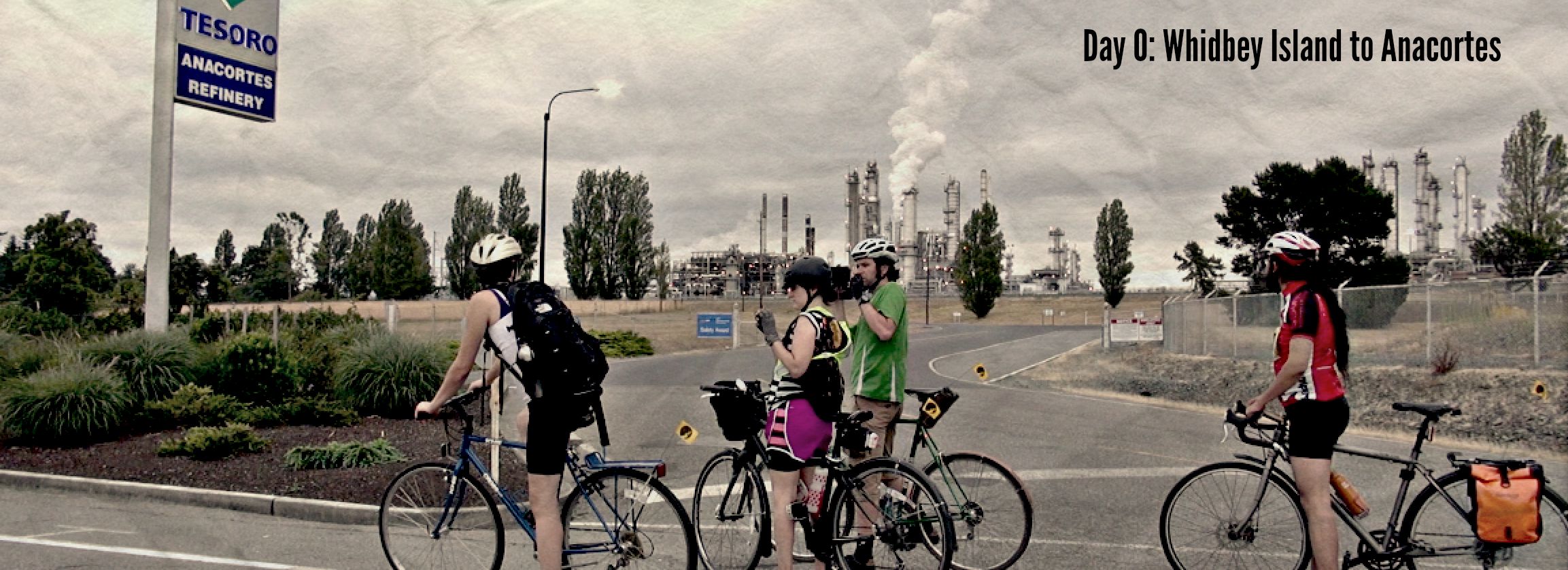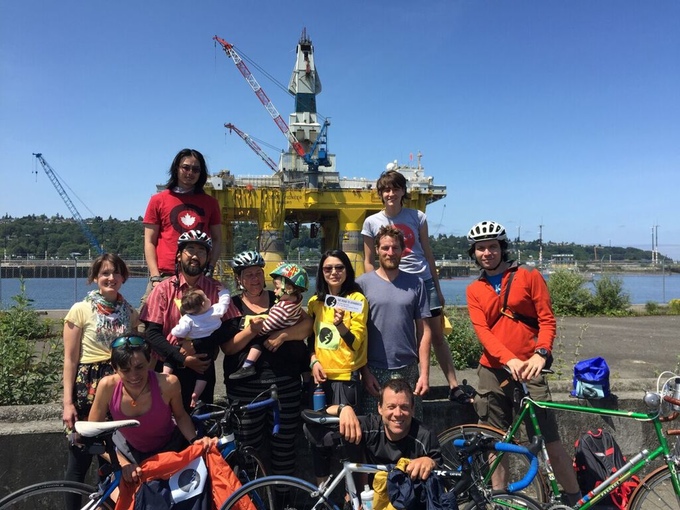Six months ago, my friend Phil Jones announced that he was making a bicycle pilgrimage to the tar sands in Alberta, Canada, and asked if anyone wanted to join him.
As he spoke, I nodded and listened, thinking Wait. Where is that? At the time I was working as a barista in Downtown Seattle, pouring espresso shots, pinging between freelance writing jobs and playing music in my band. It took me a while to make the connection in my mind that this place, one of the biggest and most devastating oil extraction projects in the world, was close enough to my home in Seattle that I, too, could ride my bicycle there – all 1,100 miles along the route of the Trans Mountain pipeline through Canada.
Over time, the idea of that ride has grown from one person to a motley crew of passionate artists and storytellers in what is now the The Road to Athabasca. I didn't arrive lightly at my decision to go. But the scope of this journey hooked my imagination, and as I read up on the tar sands, spoke to others with firsthand knowledge of the issue, and trained physically for the ride, I began to feel its true gravity and urgency. I, along with others, am now asking you to support us as we embark on this two-wheeled journey for the climate.
How dirty is it?
The term “tar sands” refers to a substance of sand, clay and tar bitumen that with intense processing can become oil (for more, see this great NPR infographic). After being extracted, the tar is mixed with a mega-cocktail of hot water, heavy chemicals, natural gas and light crude oil, thus generating a new substance: "dilbit," or diluted bitumen. The stuff then gets pumped south through oil pipelines from Alberta, reaching tankers where it gets delivered internationally. It’s a substance that The National Resource Defense Council has called a "highly corrosive, acidic, and potentially unstable blend of thick raw bitumen and volatile natural gas liquid condensate – raising risks of spills and damage to communities along their paths."
The largest field of tar sands in the world is located in Northern Alberta – a distance only marginally longer than San Francisco is from my hometown Seattle. To bring it to the local level for Northwesterners: the Trans Mountain Pipeline, one of these dilbit channels, runs right through our backyard and ends in Anacortes, Washington, after starting its journey in Edmonton, Alberta. The Trans Mountain currently transports 300,000 barrels of dilbit per day, and is expected to triple to an expected 890,000 barrels per day.
But the number that exists on paper is not something I can grasp or experience. This psychic and physical distance is my reason for making the journey. I have led a relatively privileged life amid the bountiful resources of the Northwest, a region built on an oil-driven economy, but I've never been certain of the exact costs of that privileged existence on the land and its people. The metaphor of the frog in boiling water feels appropriate here – because when we speak of our changing climate, what’s at stake is nothing less than life itself.
To fight for those stakes, I must understand them. And I cannot truly understand something I cannot see or feel. Back in April, I attended one of my first climate protests against the Shell oil rig that had anchored in Seattle’s Puget Sound. Reuben George, a leader of the Tsleil-Waututh Nation, addressed some thousands of people saying, “When something comes along that will negatively impact the people I love, I am going to stop it.” The statement hit home for me. I love my family, and I love my friends, and like most anyone else I long for a healthy planet for future generations.
But I also love this land, my home. I grew up in Oregon’s Willamette Valley, the conclusion of the Oregon Trail, which is some of the most fertile land for agriculture and a place that instilled in me a love of good food, big mountains and towering trees. In Washington state, I feel that extension of my original home.
Some may call it an overstatement to say that the oil industry has brought the war to our doorstep with the tar sands. I do not agree. I see the issue as a battle for this place on earth, home to humans and sea otters and gulls and deer and killer whales, threatened with destruction by an industry whose currency is oil and whose values are chained to profits. The same is true for the northern Albertans, whose land has been stolen, their groundwater polluted, and who have seen cancer rates skyrocket as a result of the oil industry’s activities in their region. In the end, we humans all depend on the land; to destroy it is to destroy ourselves.
Preparing for the journey
Two weeks ago, I biked 68 miles with three other cyclists, which was five times the longest distance I had ever traveled without a car. Beginning on South Whidbey Island’s pastoral hills and roadside organic gardens, we rode north over beautiful Deception Pass and west to the Tesoro and Shell oil refinery in Anacortes, seated directly on the edgewaters of the Samish First Nation.
On the way we encountered pristine water, soaring gulls and bobbing harbor seals. But when we finally arrived at the gate to the refinery, we felt like we were witness to a fearsome monolith. The high buildings, surrounded by tall gates and barbed wire, spewed plumes of black smoke into an already gray sky. To be in the presence of that weight felt like a grave reminder of the seriousness of this fight, and the damage caused by the most powerful substance on Earth. That evening at the water’s edge, I saw the brute physicality of the oil refinery rub up against the large geography of this journey that we as a group have chosen to undertake.
We call this trip a pilgrimage. A pilgrimage is any long journey, especially one traveled as a quest with a spiritual purpose. Though the tar sands are across the northern border many miles away from home, they not only play an urgent role in the politics, economy and communities of the Northwest; they are also a place on which our collective future depends. The riders participating in The Road to Athabasca believe that preserving this future necessitates a spirit of humility and witness.
Through discovery of place, through story, and through personal connection with people along the way, we want to bear witness and tell the story of the people and places that span the space between Seattle and the tar sands of Alberta. Along the way we will be challenged and pushed to limits we didn’t know we were capable of reaching physically, emotionally, spiritually. We will be hallowed and humbled as we embrace our personal power and agency to change the false narrative that our existence as a species must depend on the earth’s destruction. And we hope, in the process, to encourage others to do the same.
Please support us on this journey by donating to our Kickstarter campaign and helping spread the word.
3 WAYS TO SHOW YOUR SUPPORT
- Log in to post comments



















